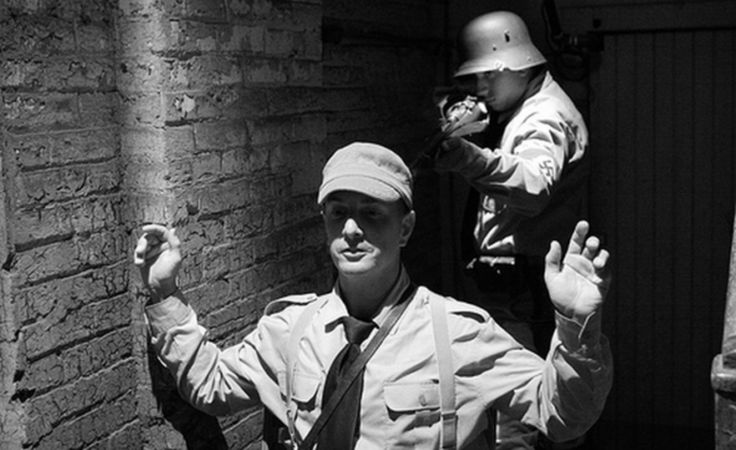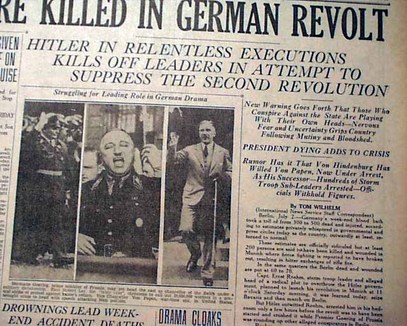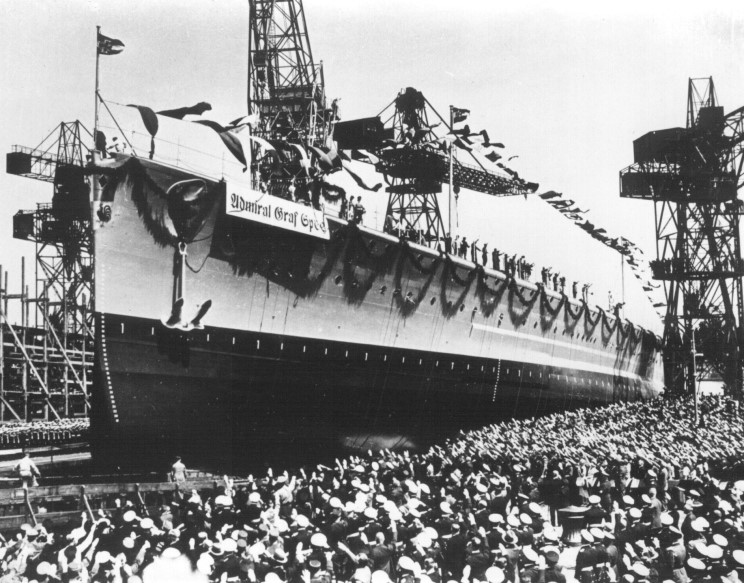June 30, 1934
Politics, Germany: In an effort to consolidate his power, Adolf Hitler embarks on a mass killing spree of various rivals, enemies and occasionally mistaken victims. The incident is given a long-standing German expression for a purge, "The Night of the Long Knives," and the expression comes to refer to this incident alone. The primary intended victims include Ernst Röhm, the head of the Sturmabteilung (SA), the paramilitary Brownshirts, and Gustav Ritter von Kahr, who had opposed and terminated the Beer Hall Putsch of 1923. The purge is directed at enemies of the German leaders.
The purge takes place in Germany from Saturday, June 30 to July 2, 1934. There is no known exact figure for the number of people killed. Most estimates are around 100 victims. The Gestapo and the SS under the command of Heinrich Himmler carry out the murders, with the background support of regular Heer and Luftwaffe troops. The code word for the operation is "Hummingbird."
Hitler flies to Munich the night before, with both local troops and the elite SS Leibstandarte "Adolf Hitler" honor guard at his disposal. Ernst Röhm and other SA leaders are vacationing at nearby Bad Wiessee. Local leaders tell Hitler that Röhm's men have been taking over the city, which is Hitler's original base, and Hitler tells Goebbels to telephone Goering in Berlin the code word "Kalibri" to begin the purge. Hitler has given Goering complete dictatorial powers to implement the plan using all of the resources of the state. Hitler himself drives out with his boys that morning to Röhm's resort hotel, where (accounts vary) Hitler walks in, finds Röhm with another man, confronts Röhm personally, and orders his arrest.
 |
| Ernst Röhm. |
Just to give a brief flavor of the victims:
- Former Reich Chancellor General von Schleicher (and his wife);
- Journalist Fritz Gerlicht, who had betrayed the 1923 Beer Hall Putsch and with whom Goering had a personal score to settle;
- The former head of the Prussian Police Erich Klausener, whom Goering had sacked the year earlier;
- Berlin SA commander Karl Ernst, pulled off a cruise ship on which he was about to set out on a honeymoon.
Strangely enough, the entire affair is legal. The Enabling Act of 1933 empowers Hitler to take whatever actions he deems necessary for the good of the state. Hitler is congratulated on his "success" by many German politicians afterwards, sometimes as the killings are still taking place. President Hindenburg, near death from old age, is kept informed throughout and sends a telegram congratulating Hitler on his "energetic and victorious action." Only in 1945 and thereafter at the post-war tribunals do the facts come to light and some wholly inadequate justice dispensed.
Kriegsmarine: Pocket battleship Admiral Graf Spee is christened by Gräfin Huberta von Spee, daughter of Vizeadmiral Maximilian Graf von Spee, the ship's namesake, at the Marine Werft, Wilhelmshaven. It glides down the slipway next to its sister ship, the Scharnhorst, also under construction.
US Homefront: At the Amateur Athletic Union national championships at Marquette Stadium in Milwaukee on June 30, 1934, Ralph Metcalfe wins the 100-meter and 200-meter sprints, pulling out the former by a hair over Jesse Owens, his biggest rival and future Olympic teammate. Metcalfe becomes the first athlete since the 1890s to win two events in the AAU championships three years in a row. Owens, Metcalfe and Hitler will all meet in August 1936 at the Olympic Games.
Pre-War
8-9 November 1923: Beer Hall PutschDecember 20, 1924: Hitler Leaves Prison
September 18, 1931: Geli Raubal Commits Suicide
November 8, 1932: Roosevelt is Elected
30 January 1933: Hitler Takes Office
February 27, 1933: Reichstag Fire
March 23, 1933: The Enabling Act
June 20, 1934: Hitler Plans the Night of the Long Knives
June 30, 1934: Night of the Long Knives
August 1, 1936: Opening of the Berlin Olympics
September 30, 1938: The Munich Agreement
November 9, 1938: Kristallnacht
August 1, 1939: Flight Tests of B-17 Flying Fortress
August 2, 1939: Einstein and the Atom Bomb
August 7, 1939: Goering Tries to Broker Peace
August 14, 1939: Hitler Decides To Attack Poland
August 15, 1939: U-Boats Put To Sea
August 16, 1939: Incident at Danzig
August 20, 1939: Battle of Khalkhin Gol
August 22, 1939: Hitler Tips His Hand
August 23, 1939: Ribbentrop-Molotov Pact
August 25, 1939: Hitler Postpones Invasion of Poland
August 27, 1939: First Jet Flight
August 31, 1939: The Gleiwitz Operation
2019




No comments:
Post a Comment